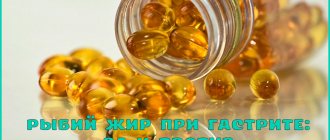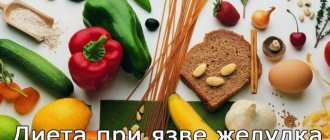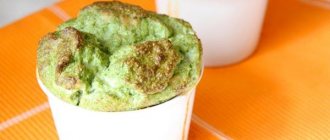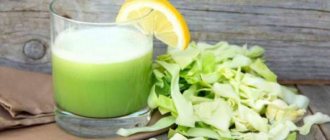Nutrition rules for ulcers
Peptic ulcer disease involves damage to the mucous membrane of the gastrointestinal tract. Therefore, in order not to further irritate the stomach and improve the effect of drug intervention, it is necessary to carefully monitor the diet. There are some nutritional rules:
- To refuse from bad habits.
- Eat 5-6 times a day in small portions.
- Eat food in a “soft” form (puree, mousse).
- Food temperature 25-65 degrees.
- Eliminate fried foods from the menu.
- Minimize the consumption of salt and spices.
- Calorie limits are 2800-3500 kcal.
List of prohibited and permitted products
| Can | It is forbidden |
| Vegetable stew | Raw vegetables |
| Cereal products | Crumbly porridge |
| Lean meat and fish | Fatty dishes, broths |
| Dairy | Strong tea or coffee |
| Fruits | Citrus |
| Bread and other products made from rye flour | White bread, sweet pastries |
| Compotes | Alcoholic drinks |
Nuts and seeds
In the acute stage of ulcerative pathology of the gastrointestinal tract, experts definitely do not recommend eating any seeds or nuts, because hard kernels can damage mucous tissues.
- During remission, gastroenterologists allow ulcer sufferers to eat walnuts, pine nuts, almonds and peanuts. These nuts can only be eaten fresh.
- As for seeds, eating them is also contraindicated, but there are some varieties that, in limited quantities, can be useful for ulcer sufferers.
- For example, flax seed. It can be consumed in powder form, or a healing decoction or jelly can be prepared from it, which normalizes digestion, reduces acidity, provides a wound-healing effect and prevents constipation.
- Pumpkin seeds, rich in zinc and fatty acids, pectins, vitamins, etc., are also useful.
Sunflower seeds are strictly prohibited for people with ulcers. They are very high in calories, and when overcooked they are also dangerous due to the accumulation of carcinogens.
Porridge: is it possible or not?
In the acute period, porridge is even a method of treatment.
Stomach ulcer is a disease that requires careful selection of food products, even if we are talking about such a dietary product as porridge. Cereals must not only be properly prepared, but also selected. The diet is designed so that the balance of carbohydrates and proteins is at the same level. It is necessary to take into account the fact that with the development of the disease, semi-viscous, semi-liquid products show a positive effect. The advantage of cereals is that they normalize this ratio and have a number of beneficial effects on the body:
- do not burden the stomach due to rapid digestion;
- do not require additional effort for chewing;
- nourish the body with carbohydrates;
- homogeneous structure does not irritate the walls of the mucous membrane.
If the illness worsens, you can cook porridge only in water.
Contraindications
Oatmeal jelly is a rare example of a product that has no contraindications. The only thing that can overshadow the impression of jelly is overeating, because you can’t abuse anything. Moderation is the main rule of a healthy lifestyle.
Eating oatmeal jelly can work a miracle, and without side effects. An example of this is not only the life of Professor Izotov himself, who studied the effect of oatmeal on himself, recovered from the severe consequences of tick-borne encephalitis and developed his own recipe for oatmeal jelly, but also thousands of letters from his grateful followers.
What grains are suitable for consumption?
When choosing porridge to eat for an ulcer, pay attention to the calorie content of the product and its composition. The doctor determines the body’s need for a particular vitamin and, accordingly, advises which cereals will best fill the missing elements. It is more often recommended to eat oatmeal, rice and semolina porridge. Whereas from the diet it is required to exclude corn, millet porridge and barley, which irritate the mucous membranes, take a long time to digest and burden the gastrointestinal tract. Wheat is also not indicated, since it is made from durum varieties and is absorbed by the body over a long period of time.
Flour products
There are also many restrictions among flour products for patients with ulcers. Pasta and bread products will not bring any significant benefit to ulcer sufferers, so there is no need to especially include them in the diet.
Eating baked goods provokes hypersecretion of hydrochloric acid, so during an exacerbation such foods should be excluded from the diet. Rye bread and bran bread products are especially dangerous, as they create an incredible load on the gastric structures.
Consumption of such bread products can significantly worsen the condition of ulcers, provoke painful attacks and aggravate the clinical picture of the pathological condition.
You can eat dried day-old bread, but only in small quantities. Such bread products will be less severe for the body of an ulcer and will not cause excessive production of hydrochloric acid secretion. It is allowed to eat crackers and dry cookies, breads that remove toxins and cholesterol.
Pasta
You can eat pasta if you have an ulcer, but you shouldn’t get carried away with it. You can eat pasta only boiled or as an addition to soup. However, they should not be consumed cold or hot, seasoned with spices and mustard, and do not overuse oil and salt.
In addition, you need to adhere to other rules. For example, you should stop eating pasta made from durum wheat.
It is also worth chopping the pasta before use and boiling it well before eating, i.e. spaghetti al dente is contraindicated for people with ulcers. In addition, there is no need to season pasta with any sauces or mayonnaise or spices. To improve the taste, it is recommended to eat pasta with salads or vegetable stew, lean meat or cutlets with gravy.
Bread
The human body receives a lot of useful components from bread products. Therefore, you should not give up bread even if you have a peptic ulcer. The main thing is to follow several principles:
- It is necessary to exclude freshly baked wheat bread from premium flour;
- Avoid rye bread and fatty cookies;
- Exclude from your diet rich rolls and pies filled with fatty minced meat, fruits, sour vegetables and berries.
But not all baked goods are prohibited. You can have kefir dough pies, cheesecakes, biscuits and crackers, yesterday’s bran bread.
Rules for consuming cereals for stomach ulcers
In order for cereal to bring only positive results, you need to know how it affects the body, how to prepare it correctly during an exacerbation or remission, and in what quantity it can be consumed. Each culture has its own subtleties and nuances in application. The product can be prepared in different ways: on a water or milk basis, with the addition of vegetable or fruit puree.
Rice porridge is not only for cabbage rolls
Round-grained, starchy varieties are an integral part of the medicinal diet.
Rice for stomach ulcers is one of the most common dishes. However, its unpolished black or red varieties are not suitable for those suffering from the disease. Only rice porridge made from white grains can be healthy. When cooked, starch is released from it, which creates a kind of film, entering the stomach, and thereby protects the organ mucosa from additional harmful effects.
The structure of rice suggests its ability to absorb and remove toxins and waste from the body, as well as restore peristalsis. In case of exacerbation, eat semi-liquid porridge, pureed through a sieve. The Hercules rice product can also be steamed, which is very useful for accelerating the absorption of protein, which is contained in large quantities in the product.
Buckwheat is completely beneficial
Buckwheat porridge is considered the healthiest of the entire variety of products in this group. This is explained by its rich composition:
- vitamins;
- mineral salts;
- microelements;
- amino acids.
Buckwheat works equally well for stomach ulcers as lean meat due to the large number of protein components it contains. However, protein in this form is not bound by fiber and is absorbed faster by the body. Amino acids act as a “transporter” and carry beneficial substances throughout all systems of the body. Buckwheat porridge is indicated during an exacerbation period. However, it must be prepared so that it is semi-liquid and has a uniform consistency. For those suffering from ulcers, the product can be mixed with vegetables or fruits, or prepared as buckwheat soup.
Semolina porridge in the diet of adults
This product is made from wheat: the cereal is ground to the consistency of millet and, when cooked, quickly turns into a homogeneous, puree-like substance that is quickly absorbed and processed by the stomach. During heat treatment, the product releases protein and starch, which leads to the fact that semolina porridge for stomach ulcers creates a membrane inside the organ that protects the mucous membrane. The vitamins contained in this variety of crops quickly nourish the body and set it up to resist pathogenic processes.
This porridge is prepared with milk both in remission and during exacerbation.
Oatmeal "Hercules" for ulcers
No breakfast is complete without this dish, even for a healthy person.
A classic breakfast, according to many, is not complete without this product. This dish should be included in the diet already in the first stages of the development of the disease. “Hercules” will have a beneficial effect on the diseased organ when it is prepared so that the consistency is similar to liquid mucus. Thanks to this, oatmeal for stomach ulcers will tighten the walls of the organ and protect the mucous membrane from damage. In case of illness, oatmeal plays the role of a “protector”, thanks to the vitamins and microelements it contains.
Jelly recipes
Berry and fruit drinks are prepared according to the following principle - all berries and fruits are washed and filled with cold water, after crushing them. Bring the mixture to a boil and cook over low heat for 15 minutes, then add sugar. The cooking time is selected according to the situation - the main thing is that the components are boiled. At the same time, dilute a spoonful of starch in cold water, add the resulting glass of water to the mixture standing on the fire and stir thoroughly. Milk may be added during the cooling process.
There is also milk jelly. It is prepared very simply - bring milk with a small amount of water to a boil. Then starch and sugar are added. Cook for about 5 minutes, stirring regularly.
Blackcurrant-based jelly
- Wash the berries and squeeze the juice out of them. Place the juice in the refrigerator.
- Pour boiling water over the resulting cake and cook for 5 minutes. You can add currant leaves.
- The broth is filtered and sugar is added. After this, boil again, removing foam from the broth.
- The starch is poured with cold boiled water and sugar is added to it.
- Boil the broth again, pouring in the squeezed juice at the end.
Rosehip dish
- Take half a tablespoon of rose hips, rinse and mash.
- Pour boiling water over for 15 minutes.
- Cook the mixture until it becomes limp.
- Strain and grind the rose hips.
- Add a tablespoon of sugar and boil again, adding half a tablespoon of starch.
Similarly, you can prepare a dish from blueberries and various dried fruits.
Apple
- Apples need to be peeled, removing the seeds. Boil them until soft.
- Strain the broth, grind the apples, add sugar.
- Boil again and add starch diluted with cold water.
- Wait until it boils.
Chemical composition and medicinal properties
Oats are an annual herbaceous plant cultivated on an industrial scale as a food and feed crop. The oat genus includes more than 20 species, of which the most important from an economic point of view is common or fodder oats.
Raw oats, collected in the husk, are used as medicinal raw materials for preparing decoctions. Whole oatmeal, made by grinding, steaming, peeling, is suitable for preparing pilaf, porridge, and stuffing.
The main substances of grain that determine its nutritional value are carbohydrates (59.5 g), proteins (12.3 g), fats (6.1 g).
The carbohydrate complex includes starch as the main substance, dietary fiber, sugars (fructose, glucose, sucrose, lactose, galactose, maltose).
Cereals contain many beneficial substances:
- vitamin A, represented by beta and alpha carotene, lycopene, retinol;
- vitamin B complex: thiamine, riboflavin, choline, pyridoxine, folate, pantothenic acid;
- vitamin E, K, D, H, nicotinic acid;
- macroelements: potassium, calcium, magnesium, sodium, phosphorus, silicon, chlorine, sulfur;
- trace elements: iodine, boron, iron, vanadium, copper, cobalt, fluorine, zinc, chromium, selenium, manganese, nickel, molybdenum.
Oats are valued for their wide range of pharmacological activities. It has a pronounced diuretic and anti-inflammatory effect, regulates blood sugar levels, which is especially important for people with diabetes, provides active cleansing of the liver, kidneys, blood, and promotes hematopoiesis.
The cereal has a beneficial effect on the state of the nervous system, heart and blood vessels, strengthens the immune system, relieves insomnia, and activates mental activity.
Oats help normalize metabolism, actively absorb carbohydrates by the body, help in the fight against colds, hypertension, reduce the likelihood of cancer, and slow down the aging process.











